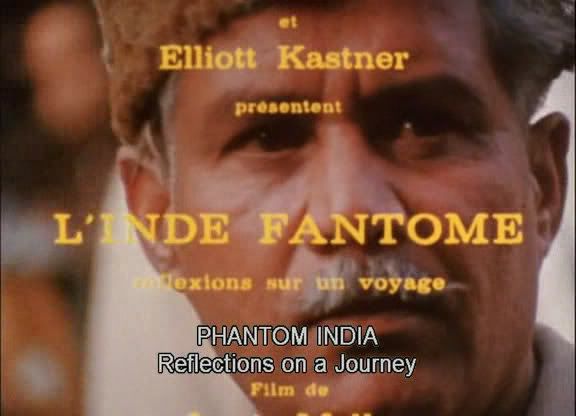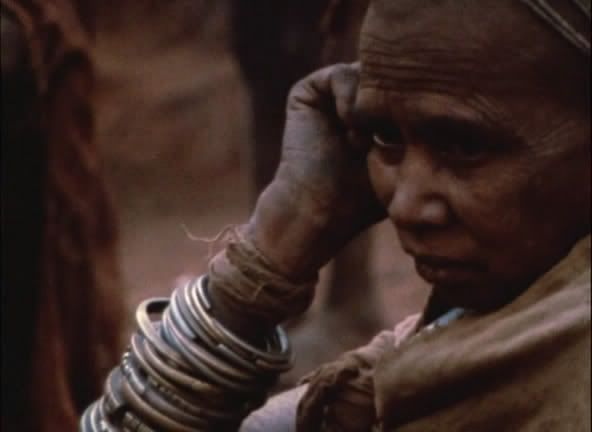

Description: Widely regarded as the crowning achievement of his career, Louis Malle's 378-minute documentary Phantom India provides an epic-length portrait of life in India circa 1968. Biographically, it succeeded Malle's United Artists period movie Le Voleur and the production of the "William Wilson" segment in Spirits of the Dead, and arrived at a time of intense personal crisis for the director: 34-year-old Malle, terrified of falling back into the same bourgeois mindset that he had worked so aggressively to escape, felt it re-encroaching; he also fell into a nasty funk that reportedly drove him to the brink of suicide. With his marriage to Anne-Marie Deschodt in pieces, Malle thus decided to wipe the slate completely clean: he dropped out of western society and headed to India, with a two-man crew (sound man Jean-Claude Laureux and co-cinematographer Etienne Becker), traveling without maps and without a compass - destination and whereabouts unknown. The three shot documentary footage instinctively, flipping on their cameras each time something caught their attention. The journey itself lasted a little under four months, from January 5, 1968 through May 1, 1968; it generated over 30 hours of footage, which Malle and editor Suzanne Baron subdivided thematically and edited into seven segments of about 54 minutes each. The individual episodes are as follows:
Episode 1, "The Impossible Camera"
Largely a heightened meditation on the overarching theme of the epic - the impossibility of viewer understanding within the cinematic framework of a documentary - this episode opens with glimpses of "westernized" Indian residents who demonstrate extreme influence by modern philosophical and political concepts such as Communism. Dissatisfied, and determined to find the "real India," Malle and his crew plunge deeper, photographing such indigenous events as a Hindu wedding, the celebration of Shiva, a bizarre Indian Catholic ritual performed in full drag and a trip to the temple of Konarak. They also encounter and question two "hippie" Frenchmen who have dropped out of western society and moved to India as wanderers. The episode wraps with an argument between shore fishermen and a trader.
Episode 2, "Things Seen in Madras"
Per its title, this episode compiles much of the footage shot by Malle and his crew during their time in Madras. It opens with a temple celebration at Kapaleshvara, then explores the political climate of Madras, with a glimpse of a satire performed on the stage. Later, Malle and co. visit the Family Planning Ward at the Madras fair (where tour guides offer humorous illustrations of birth control procedures). The episode wraps with a trip to a Bollywood movie studio, with a behind-the-scenes glimpse of the production of the movie Thillana Mohanambal.
Episode 3, "The Indians and the Sacred"
This episode of Phantom India explores the contradictions and paradoxes of Indian religion. Opening with the most grotesque image in the entire epic - a yogi who has pierced his entire body (face, arms, legs, groin, tongue, etc.) with a cage bearing giant needles -"The Indians and the Sacred" segues into a trip to see a giant statue of Nandi the Bull, and then into southern India, for a glimpse of more idiosyncratic and tightly-knit Indian belief systems. Later, Malle and his team visit the temple of Madurai, tour a garbhagrilha, and greet the saddhus, strange, potentially dangerous shaman-like figures who mingle with, and are possessed by, powerful and occasionally malevolent spirits.
Episode 4, "Dreams and Reality"
This episode is grounded in the notion that time - in the western sense - does not exist for Indian men and women, and that Malle and his crew have become one on this level with their Indian subjects. Malle indicates that they are gaining an understanding of their subjects not on a conceptual level, but on rhythmic, sensorial and atemporal levels. The episode then moves into a series of events and spectacles, loosely connected by their surrealistic, hallucinatory nature and sheer inexplicability for a western viewer. These include: religious rites performed on a seashore by Indian priests; the sight of a man pushing a sewing machine on a cart down a blazing hot road; the vestiges of the dilapidated British rail system in India; and a horrifying glimpse of "enslaved" elephants in an animal sanctuary. The episode wraps with a tour of the political climate of Kerala.
Episode 5, "A Look at the Castes"
Per its title, this episode explores the rigid Indian caste system. It opens with a conversation vis-à-vis Thomas Howard, an American man in his twenties who moved to an Indian village to teach locals improved agrarian techniques. Later, Malle details the various levels of caste that actually - as he reminds his audience - break down into thousands of smaller subdivisions. The film visits women assigned different well functions based on their respective castes, social outcasts known as the Harijans (or untouchables) and a lower-rung caste of village washermen known as dhobis. As Malle details the history of the caste system on the soundtrack, he travels with his crew to the Red Fort fabric factory in Delhi, and then to a Bombay shantytown, where a group of mourners celebrate a death with choruses of "For He's a Jolly Good Fellow" (with Malle reminding the audience that such celebration is inveterately linked to a desire to break out of the cycle of reincarnation). The episode wraps with a depiction of a local village sport and a trip to the Panchayat.
Episode 6, "On the Fringes of Indian Society"
This episode charts the subcultural behaviors and customs of numerous Indian minority groups. It begins with an illustration of tribal culture: Malle, Becker and Laureux spend an extended period of time with the Bandos, a bellicose and semi-barbaric mountainous tribe that inhabits around 100 villages in the region of Orissa and teeters on the verge of extinction via complete assimilation into mainstream Indian society. Malle's cameras witness the Bandos constructing a cob house; in his narration, he discusses the "sexual dormitories" established for tribal adolescents, as well as the sun worship and fertility ceremonies that create an enduring sadness in the villagers' hearts. Following an illuminative trip to the Bando market, Malle and co. segue into discussions of more westernized subcultures in Indian society, including Indian Christians, Indian Jews, and an oddball religious cult run by Sri Aurobindo and administered by a figure known only as "The Mother." The episode then cuts back to tribal investigation for an exploration of the Todas tribe, a subcultural group that intrigues Malle thanks to its complete absence of war, hunger and societal injustice. Malle highlights many of the tribe's unusual beliefs, including the idea that man was created after being pulled out of a river by the tail of a bull, and the notion of "sexually initiating" all of the tribe's adolescent girls at the hands of one village "teacher."
Episode 7, "Bombay: The Future India."
In the concluding episode of Phantom India, Louis Malle, Jean-Claude Laureux and Etienne Becker reach one of India's most populous cities - that of Bombay - and chart the many colorful facets of this metropolis with their cameras. The episode opens with discussion of the city's geographic locale, moves in for a glimpse of Muslim craftsmen hard at work, visits the blind muezzin and witnesses the daily pilgrimage to the Haji Ali Mosque at low tide. A visit to Bombay's petrochemical plants and red-light district follows; Malle highlights the irony that alcohol is forbidden in this city, according to Muslim law, but prostitution widely encouraged. The film then segues into a glimpse of the Bombay stock exchange, with its striking resemblance to the floor of the NYSE in Manhattan; along these lines, Malle works in an interview with Pachavai Patel, an affluent Indian industrialist who made his money selling farm equipment. The episode then glimpses a Parsi wedding, and takes a trip to a school where the instructor of Yehudi Menuhin teaches his students various meditative positions. After an extended conversation with a wealthy, unidentified Indian socialist and a trip to one of Bombay's automated textile mills, Malle and co. visit a terrifying racist political sect led by local demagogue Bal Thackeray, who encourages systematic violence against immigrants in the southern regions of India. A discussion with the Oxford-educated Indian girl Rajani Desai follows; she predicts that most of the country will eventually industrialize. The episode - and Phantom India per se - wrap with a temple celebration, a trip to the salt marshes, and - finally - a glimpse of several Indian men straining to push a heavy cart through traffic and over a large hill.
~ Nathan Southern



http://rapidshare.com/files/194025923/Phantom_India_-_episode_1.avi.001
http://rapidshare.com/files/194032679/Phantom_India_-_episode_1.avi.002
http://rapidshare.com/files/194039238/Phantom_India_-_episode_1.avi.003
http://rapidshare.com/files/194045764/Phantom_India_-_episode_1.avi.004
http://rapidshare.com/files/194048690/Phantom_India_-_episode_1.avi.005
http://rapidshare.com/files/194054902/Phantom_India_-_episode_2.avi.001
http://rapidshare.com/files/194062024/Phantom_India_-_episode_2.avi.002
http://rapidshare.com/files/194069040/Phantom_India_-_episode_2.avi.003
http://rapidshare.com/files/194073384/Phantom_India_-_episode_2.avi.004
http://rapidshare.com/files/194075255/Phantom_India_-_episode_2.avi.005
http://rapidshare.com/files/194080648/Phantom_India_-_episode_3.avi.001
http://rapidshare.com/files/194087061/Phantom_India_-_episode_3.avi.002
http://rapidshare.com/files/194091723/Phantom_India_-_episode_3.avi.003
http://rapidshare.com/files/194096117/Phantom_India_-_episode_3.avi.004
http://rapidshare.com/files/194097877/Phantom_India_-_episode_3.avi.005
http://rapidshare.com/files/194102224/Phantom_India_-_episode_4.avi.001
http://rapidshare.com/files/194106178/Phantom_India_-_episode_4.avi.002
http://rapidshare.com/files/194110128/Phantom_India_-_episode_4.avi.003
http://rapidshare.com/files/194113682/Phantom_India_-_episode_4.avi.004
http://rapidshare.com/files/194115406/Phantom_India_-_episode_4.avi.005
http://rapidshare.com/files/194119363/Phantom_India_-_episode_5.avi.001
http://rapidshare.com/files/194125066/Phantom_India_-_episode_5.avi.002
http://rapidshare.com/files/194130903/Phantom_India_-_episode_5.avi.003
http://rapidshare.com/files/194136249/Phantom_India_-_episode_5.avi.004
http://rapidshare.com/files/194140294/Phantom_India_-_episode_5.avi.005
http://rapidshare.com/files/194145820/Phantom_India_-_episode_6.avi.001
http://rapidshare.com/files/194151781/Phantom_India_-_episode_6.avi.002
http://rapidshare.com/files/194158530/Phantom_India_-_episode_6.avi.003
http://rapidshare.com/files/194165681/Phantom_India_-_episode_6.avi.004
http://rapidshare.com/files/194171892/Phantom_India_-_episode_6.avi.005
http://rapidshare.com/files/194178954/Phantom_India_-_episode_7.avi.001
http://rapidshare.com/files/194186276/Phantom_India_-_episode_7.avi.002
http://rapidshare.com/files/194193273/Phantom_India_-_episode_7.avi.003
http://rapidshare.com/files/194201125/Phantom_India_-_episode_7.avi.004
http://rapidshare.com/files/194207556/Phantom_India_-_episode_7.avi.005
Language: French (hardcoded English subtitles)
no pass



0 comments:
Post a Comment